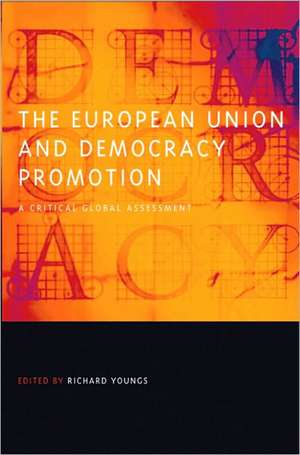The European Union and Democracy Promotion – A Critical Global Assessment: Democratic Transition and Consolidation
Autor Richard Youngsen Limba Engleză Hardback – 28 oct 2010
The European Union has made firm commitments to democratic reforms and human rights initiatives around the world. This volume examines and evaluates the efficacy of these efforts.
Individual case studies review the background and discuss the current state of initiatives in Eastern Europe, the Balkans, the Ukraine, Central Asia, Morocco, Iraq and the Persian Gulf, and Nigeria. The contributors identify lessons from each instance and offer concrete policy recommendations for strengthening the EU's efforts to promote democracy. Together, these assessments show that EU member states are less invested in promoting political change in third world nations, suggesting that the EU is failing to live up to its ideals.
Designed to spur debate on how to incorporate democracy and human rights initiatives into the mainstream foreign policy of the EU and its member states, this study challenges the standard view that the EU has established itself as a distinctive normative power.
Preț: 328.23 lei
Preț vechi: 446.59 lei
-27% Nou
Puncte Express: 492
Preț estimativ în valută:
62.81€ • 68.21$ • 52.76£
62.81€ • 68.21$ • 52.76£
Carte indisponibilă temporar
Doresc să fiu notificat când acest titlu va fi disponibil:
Se trimite...
Preluare comenzi: 021 569.72.76
Specificații
ISBN-13: 9780801897320
ISBN-10: 0801897327
Pagini: 216
Dimensiuni: 167 x 235 x 20 mm
Greutate: 0.44 kg
Editura: Johns Hopkins University Press
Seria Democratic Transition and Consolidation
Locul publicării:Baltimore, United States
ISBN-10: 0801897327
Pagini: 216
Dimensiuni: 167 x 235 x 20 mm
Greutate: 0.44 kg
Editura: Johns Hopkins University Press
Seria Democratic Transition and Consolidation
Locul publicării:Baltimore, United States
Notă biografică
Richard Youngs is the director of FRIDE, Madrid, and an associate professor at the University of Warwick. He has authored five books, including Europe's Role in Global Politics: A Retreat from Liberal Internationalism.
Descriere
Designed to spur debate on how to incorporate democracy and human rights initiatives into the mainstream foreign policy of the EU and its member states, this study challenges the standard view that the EU has established itself as a distinctive normative power.


